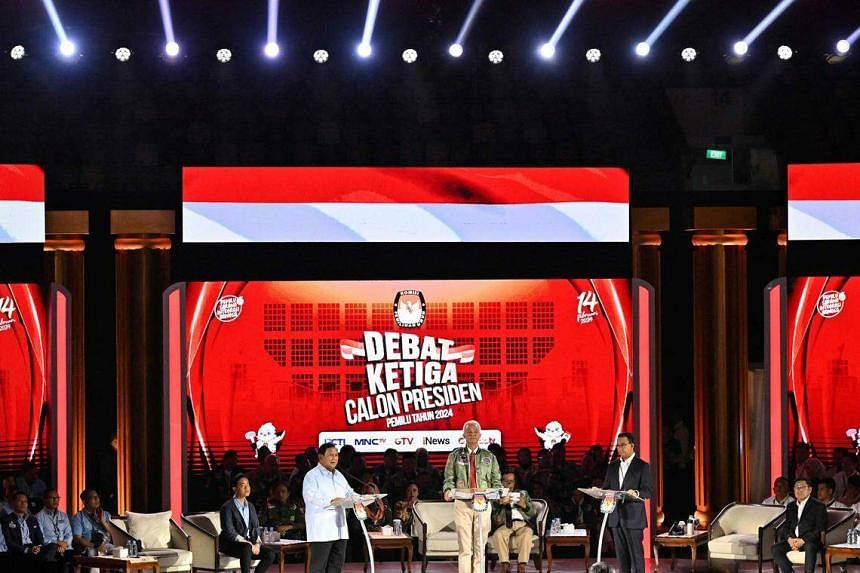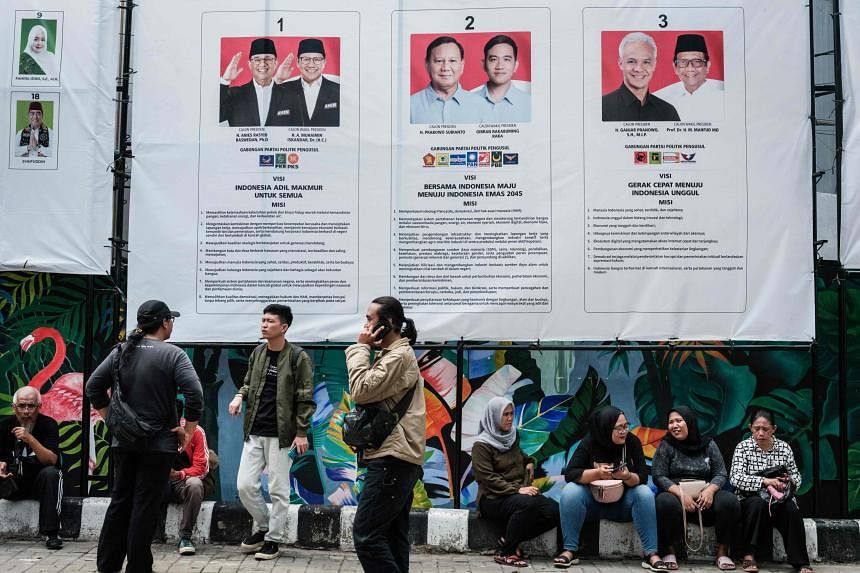JAKARTA – Indonesia’s three presidential candidates wrestled with the topic of the South China Sea, the role that regional grouping Asean plays in keeping peace in the waterway, and other issues of defence, foreign policy and ethics in their third debate on Jan 7.
On the tensions in the South China Sea, former Central Java governor Ganjar Pranowo suggested there be a temporary agreement between the parties involved to avoid the conflict escalating.
“My proposal is to have a temporary agreement. We have to push this and have this as our initiative, so that we can prevent outcomes we don’t want,” he said.
His response drew criticism from former Jakarta governor Anies Baswedan, who questioned why Mr Ganjar did not mention Asean in his answer, stressing that the bloc played an important role in solving issues concerning the waterway.
“Asean is... key when talking about the South China Sea,” Mr Anies said.
In his reply to Mr Anies, Mr Ganjar said Asean needs to be “revitalised”, given the complexity of the bloc’s relations which complicates its decisions.
The session on Jan 7 was the third of five scheduled debates for Indonesia’s presidential elections on Feb 14, in which more than 204 million people are eligible to vote.
In the first debate, on Dec 12, the presidential candidates discussed issues relating to law, human rights, governance, corruption, democracy and tolerance.
The vice-presidential candidates took to the stage in the second debate, on Dec 22, where they talked about the economy, investment and trade.
Meanwhile, at the latest debate, the third candidate, Defence Minister Prabowo Subianto, stressed that the tensions in the South China Sea showed how important it is that Indonesia, although not directly involved, should have a strong national defence system.
China and four Asean member states – Brunei, Malaysia, the Philippines and Vietnam – have overlapping claims in the strategic waterway, an issue that has remained unresolved for decades.
China and Asean agreed more than 20 years ago, in 2002, to work towards creating a code of conduct for activities in the waterway. But negotiations for the agreement have stalled for various reasons, most recently the Covid-19 pandemic which made it more difficult to hold in-person meetings.
The grouping has a non-interference policy, where discussions are made or actions are taken without intervening excessively in other members’ affairs.
Indonesia, which held the chairmanship of Asean in 2023, said last July that the grouping agreed on guidelines to expedite discussions on the code of conduct, but experts have said that this is not substantive progress.
During the almost three-hour debate, Mr Anies also pressed Mr Prabowo on ethics, specifically on the ethical standards of a nation’s leader.
Responding, Mr Prabowo said leadership requires fundamental values, which include a sense of patriotism, honesty and integrity.
“Personal ambition should not be allowed to deceive people and put them in danger,” he said.

Emphasising the importance of ethics, given the president’s control of the military, Mr Anies then cast doubt over Mr Prabowo’s ability to maintain ethical standards, saying the minister’s running mate had allegedly violated them.
Mr Prabowo’s running mate – President Joko Widodo’s son and Solo mayor Gibran Rakabuming Raka – was the subject of controversy a few months ago when a rule change paved the way for his candidacy.
Indonesia’s Constitutional Court in October 2023 ruled that the minimum age of 40 to run for the nation’s top posts would not apply to anyone who has held or currently holds a position won through a general election, including regional ballots.
To this, Mr Prabowo said Mr Anies was welcome to sit down with him to discuss Defence Ministry programmes.
He added, without specifying any incidents, that it was not Mr Anies’ position to question him about ethics.
“I feel that you are posturing and misleading. I don’t think you have the right to talk about ethics because you have set a bad example regarding ethics,” Mr Prabowo said.
Later after the debate, in response to questions from the media about Mr Prabowo’s invitation, Mr Anies said that the minister should explain his position using a forum that can be heard by a large audience.
“The point is not to sit over coffee but to discuss data and facts, openly, and not behind closed doors,” he said.
A survey by local pollster Indikator Politik Indonesia from Dec 23 to 24 showed the Prabowo-Gibran pair with a strong lead over their opponents, with their support at 46.7 per cent.
Support for Mr Ganjar and his vice-presidential candidate, Chief Security Minister Mahfud MD, was at 24.5 per cent, while Mr Anies and his running mate, former minister Muhaimin Iskandar, received 21 per cent.

